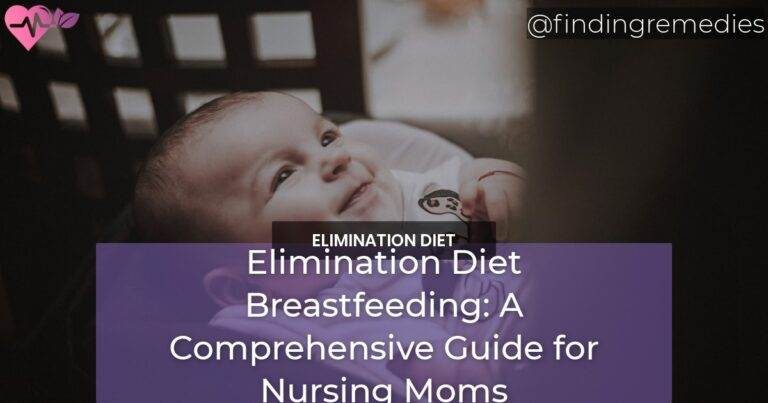Are you considering an elimination diet while breastfeeding? If so, you’re not alone. Many nursing moms feel frustrated and overwhelmed when trying to determine which foods to avoid while breastfeeding.
This article will provide a comprehensive guide to help you understand the potential benefits of an elimination diet breastfeeding, and how to safely and effectively make dietary changes. You’ll learn the key components of an elimination diet, how it can help reduce symptoms of food sensitivities, and how to make sure that you and your baby get all the essential nutrients you need. We’ll also discuss the potential risks of eliminating certain foods from your diet, as well as tips for making the transition easier. With this guide, you can make informed decisions about your diet, and ensure that both you and your baby get the best nutrition possible.
Table of Contents
Understanding Elimination Diet while Breastfeeding
Introduction to Elimination Diet and Breastfeeding
As a breastfeeding mother, your baby’s health is your top priority. However, certain foods in your diet may cause problems for your baby. An elimination diet is a dietary approach used to identify allergens and intolerances that may cause negative reactions in your child. It involves eliminating a specific food or group of foods from your diet and gradually reintroducing them to determine if they are safe for your baby.
Elimination diets are essential for breastfeeding mothers because what a mother eats can affect the composition of her milk, and the baby’s health. It is therefore crucial to identify and eliminate allergens from the diet to prevent allergic reactions in the baby.
Common Allergens that Affect Breastfeeding Babies
Breastfeeding mothers need to be aware of common allergens such as milk, eggs, soy, wheat, peanuts, tree nuts, fish, and shellfish. These allergens can affect babies by causing colic, eczema, hives, diarrhea, and vomiting. It is important to identify these allergens early and eliminate them from the mother’s diet to prevent negative reactions in the baby.
Implementing an Elimination Diet while Breastfeeding
Total Elimination Diet for Breastfeeding Mothers
A total elimination diet involves eliminating all allergenic foods from the mother’s diet. This diet should be carried out for at least two weeks to allow time for the allergens to clear from the mother’s system. Afterward, one food is gradually reintroduced at a time to determine if it causes a negative reaction in the baby.
The benefits of a total elimination diet are that it can quickly identify allergens, and it is relatively easy to follow. However, the drawbacks are that it can be challenging to maintain a balanced diet, and it can cause stress and anxiety for the mother.
ALSO READ
Hypoallergenic Diet for Breastfeeding Mothers
A hypoallergenic diet involves eliminating common allergens while still consuming other foods that are less likely to cause reactions. This diet is less restrictive than a total elimination diet but still eliminates the most common allergens.
To carry out a hypoallergenic diet, a breastfeeding mother should eliminate milk, soy, wheat, eggs, peanuts, tree nuts, fish, and shellfish. The mother can still consume vegetables, fruits, chicken, turkey, and lamb. The diet should be carried out for at least two weeks, and allergenic foods can be gradually reintroduced one at a time.
The benefits of a hypoallergenic diet are that it is less restrictive than a total elimination diet and can still effectively identify allergens. However, the drawbacks are that it can still be challenging to maintain a balanced diet and may not identify less common allergens.
Duration of Elimination Diet while Breastfeeding
The duration of the elimination diet while breastfeeding varies from one mother to another. It depends on how long it takes for the allergens to clear from the mother’s system and the baby’s reaction to the reintroduction of allergenic foods.
Mothers should stick to the elimination diet for the recommended duration to ensure that they identify all allergens that may cause problems for their baby.
Tips and Tricks for Implementing an Elimination Diet while Breastfeeding
Foods to Avoid on an Elimination Diet for Breastfeeding Mothers
Breastfeeding mothers should avoid common allergenic foods such as milk, eggs, soy, wheat, peanuts, tree nuts, fish, and shellfish. Other foods that may cause problems for some babies include corn, citrus fruits, and chocolate.
It is essential to read food labels carefully, as allergens can be found in unexpected foods such as bread, salad dressing, and processed foods.
How to Maintain a Balanced Diet while Eliminating Allergens
Eliminating allergens from the diet can make it challenging to maintain a balanced diet. However, breastfeeding mothers can still consume a variety of foods to ensure adequate nutrition.
Mothers should include foods such as fruits, vegetables, whole grains, lean proteins, and healthy fats. It is also important to consult a healthcare professional for dietary advice to ensure that the mother and baby are getting adequate nutrition.
Coping with Challenges While on an Elimination Diet for Breastfeeding
Eliminating allergens from the diet can be challenging for breastfeeding mothers. Common challenges include feeling deprived, missing favorite foods, and social isolation.
Mothers can cope with these challenges by seeking support from family and friends, finding new recipes, and focusing on the benefits of the diet. It is also important to remember that the elimination diet is temporary and can improve the baby’s health.
Conclusion
Importance of Elimination Diet for Breastfeeding Mothers
Elimination diets are essential for breastfeeding mothers to identify and eliminate allergenic foods that may cause problems for their babies. Mothers should be aware of common allergens, implement a total elimination or hypoallergenic diet, and adhere to the diet for the recommended duration.
By following an elimination diet, breastfeeding mothers can improve the health of their babies and ensure that they are getting adequate nutrition. Remember to consult a healthcare professional for advice and support during the elimination diet process.
RELATED ARTICLES:

